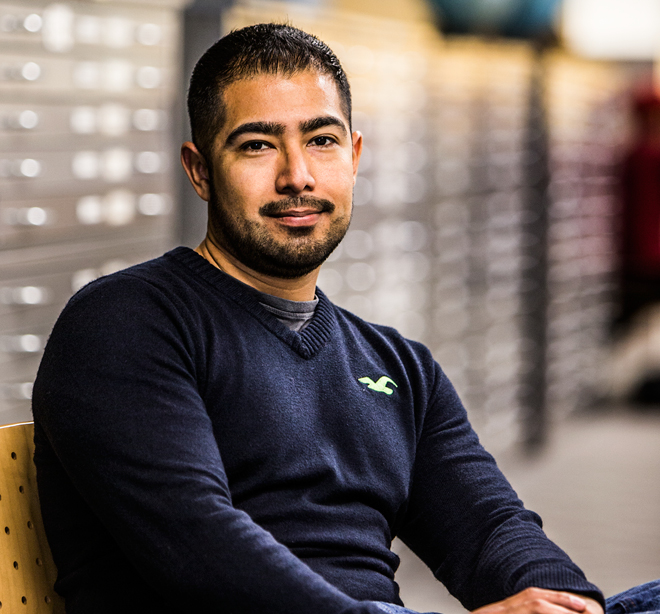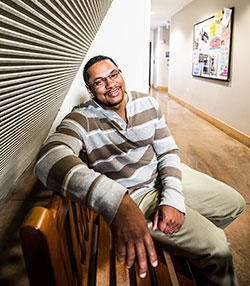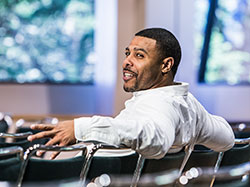Project Rebound is transforming lives one degree at a time

Making its way around Solano state prison, says Jorge Mota, “was a rumor, almost a myth, that there was this program that would help you get into college and help to pay for your tuition.”
Now a junior at SF State studying psychology, Mota knows it was no myth. He and his fellow inmates were hearing about Project Rebound, a program that helps the formerly incarcerated enroll in the University and supports them as they pursue their education.
Mota was serving 17 years for a drug-related attempted murder charge when he was accepted into the program. Rebound staff helped him earn his associate’s degree through correspondence courses, apply to SF State and request financial aid. Soon after he was freed in November 2011, Mota was taking classes.
“They kept telling me, ‘Hang in there,’” he says. “It kept me going, knowing I could get my degree.”
Project Rebound was founded in 1967 by Professor John Irwin, himself an ex-convict. In its 47 years, the program has helped hundreds of students complete their degrees. Rebound staff work with people who have been convicted of all sorts of crimes no matter how long they’ve been in prison or their level of education. (The only exception: The program doesn’t provide services to sex offenders due to the proximity of child care centers.)
Rebound supports prospective students through the entire process of attending SF State, starting with earning a GED. In one case, staff members even brought books and assignments to an inmate so she could start her classes before her release date.
Once a student is on campus, Rebound provides food vouchers, BART tickets and money for books. The program also connects participants to student interns who help them navigate college. And if a participant has problems with parole or trouble receiving a state license for work such as nursing or counseling, Rebound is there with legal assistance.
It’s a big job for a staff of three.

“We have built a network that we rely on,” explains Rebound Director Jason Bell (B.A., ’05; M.S., ’11). “Whether it’s advising, enrollment, financial aid, we have a person we can call in every department on campus.
”Yet Project Rebound is a rarity. No other university in the state has such a program. That’s because California has viewed incarceration as retribution rather than rehabilitation, says Jeffrey Snipes, program chair and associate professor of criminal justice studies. As a result, educational and support programs are lacking in the prison system.
That attitude is unfortunate, says Bell. No matter what you think of people who have committed crimes, ensuring that they don’t return to prison is in everyone’s interest.
“Would you rather have them standing on a street corner with no skills, or have them educate themselves?” Bell asks.
Statistics support his point. According to the Texas Department of Criminal Justice, those who leave prison without receiving any education nationwide have a 67 percent chance of returning within 18 months. On the other hand, those who earn bachelor’s degrees while serving out their terms return only 6 percent of the time.
A program like Rebound can make all the difference, Snipes says. Not only does it provide education and a path to better-paying jobs, it also offers social support for students.
“If you’re released back into society and you don’t have any kind of formal support, you’re kind of lost,” Snipes says. “You’re going to go back into the same habits and hang out with the same people.”
Rebound counters that by making sure participants feel like a part of the SF State community. “It’s not an insular program,” he says. “They connect their students across the campus.”
And Rebound students know they can find a sympathetic ear at the program’s one-room office in the Cesar Chavez Student Center. Bell and Rebound’s two other full-time staff members are all alumni of the program, so they understand what the students are experiencing.
Bell served nine and a half years for attempted murder. With Rebound’s help, he graduated with a degree in sociology and later earned a master’s in counseling. He started at Rebound as a volunteer and became its full-time director in 2006.
“I enjoy seeing people reinvent themselves through education,” Bell says. “When you’re inside, college seems like a place in the clouds. But thinking like that — it limits you. You think you’re not smart enough. Then you realize you don’t have to know everything before you get here.”
One thing many recent Rebound students haven’t known about is the Internet. Prison inmates don’t have online access, sometimes leading to confusion when they begin dealing with 21st century higher education.

“I had heard about the Internet, but had never gone on,” says Eric Durnell (B.A., ’13), who participated in the program and is now its outreach coordinator.
“I didn’t know what button to push.”
That didn’t hold Durnell back for long thanks to the understanding and support he found on campus. For example, an F in a writing course eventually turned into an A after he explained to the teacher that he had been in prison and didn’t know how to submit his papers online.
Despite the challenges they face, Rebound’s students are studying in all fields, including highly competitive majors such as nursing and engineering. Occasionally, alumni call in to update Rebound on their lives. One is enrolled at Hastings College of the Law. Two others have earned degrees at Columbia University. Several have started their own businesses.
Many want to use their experience to guide others. Mota, who has been mentoring students at San Francisco’s Balboa High School, hopes his psychology degree will give him the opportunity to counsel young people.
“My passion is to work with at-risk youth [and] help them make better choices,” he says.
Unfortunately, as the prison population in California grows, Rebound is struggling to serve all those who want to attend college. According to Bell, there are more than 100 former inmates enrolled in the program, and a $150,000 grant from the Columbia Foundation will help it reach out to even more. But Bell says there’s only so much Rebound can do on its own.
Because parolees can’t leave the area they have been released to, Project Rebound can help only those ex-cons who will be or have been paroled to the Bay Area. Bell has been encouraging other California schools to start programs similar to Rebound.
“I would love to be able to call someone at Fresno State and ask them to take on a student, but that’s not happening yet,” Bell says.
Until then, he and his colleagues at SF State will continue their daily work — work Bell describes as “rebuilding hope.”
“Rebound allows you to change, to reinvent yourself, even when people have given up on you,” he says. “We are tearing down the roadblocks that we’ve put up for ourselves. We’re doing things we would never have imagined possible, and it’s all because of education.”
By MANDY ERICKSON /// Photos by ERIC MILLETTE